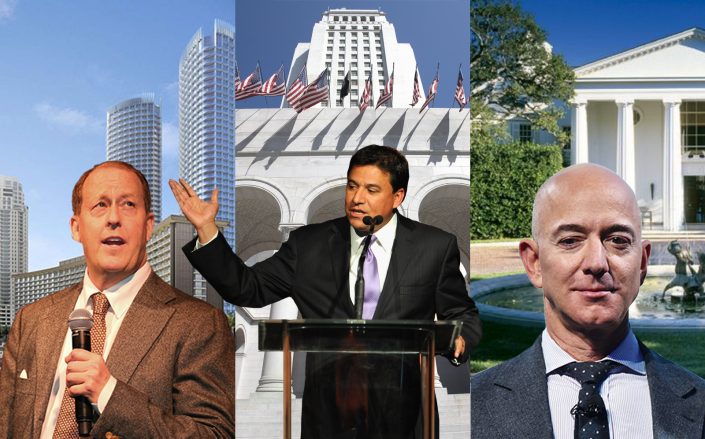
From left, Michael Rosenfeld and Century Plaza, Jose Huizar and City Hall, Jeff Bezos and 1801 Angelo Drive (Getty Images)
“It was the best of times, it was the worst of times. It was the season of darkness, it was the spring of hope, it was the winter of despair.”
Charles Dickens sure nailed the state of the Los Angeles real estate market in 2020.
While the office market stared into the abyss and retail continued to get pummeled, the top of the residential market went into overdrive. Spec developers who flew too close to the sun got burned, while others who hoped to score political brownie points got ensnared in a major City Hall scandal.
Here are some of the year’s biggest highlights.
Filthy lucre
One of the largest political corruption scandals in L.A. history put a spotlight on real estate developers this year.
In June, a 116-page affidavit detailed how former L.A. City Council member Jose Huizar, a central character in DTLA’s renaissance, allegedly shook down Carmel Partners, a prominent builder with several projects in the city.
The affidavit included lurid details of how Carmel Partners gave $125,000 to Huizar and volunteered to provide opposition research on “two young female former Huizar staffers” who had filed sexual harassment lawsuits against the politician.
Meanwhile, another developer, Shenzhen New World Group, was accused of funneling Huizar $600,000 to settle a separate sexual harassment complaint. And a third, Shenzhen Hazens, was accused of paying Huizer bribes.
In October, the Justice Department announced that Shenzen Hazens’ Southern California subsidiary had agreed to pay a $1 million fine to resolve the criminal investigation into its payments. A late November filing brought new criminal counts against Huizar and against Shenzhen New World, its chairman Wei Huang, L.A. developer Dae Yong Lee and the Lee-incorporated 940 Hill LLC.
The list of “known unknowns” in the scandal, however, is extensive.
White-boxing the brokerage
The defections started slowly at first. Last October, star Rodeo Realty agent Ben Bacal trotted out his own flag, though it flew under the banner of white-label brokerage called Side. Bacal was followed this year by Compass’ Kofi Nartey.
Side’s raison d’être is simple, yet provocative. Most real estate agents are “hucksters and charlatans,” according to the startup’s CEO, Guy Gal, and even among the ones who are fit to practice brokerage, a small group does most of the business.
Side’s strategy is to find those top performers, woo them over, and then get the hell out of their way. The argument has persuaded both notable dealmakers and venture capitalists , and points to a continuing evolution of residential brokerage — namely, how some top agents are increasingly questioning the value proposition of traditional firms.
A tale of two pandemics
L.A.’s real estate market took several body blows from the pandemic, mirroring the fate of other major metros throughout the country: In-store retail was decimated, office leasing plummeted to record lows, the luxury condo market struggled to gain traction and the multifamily market saw an alarming rise in vacancies and unpaid rent combined with eviction moratoriums.
And though L.A.’s office market has been battered, streaming services have gobbled up more space, which has created opportunity. Over the summer, Blackstone Group agreed to buy a 49 percent stake in Hudson Pacific Properties’ $1.65 billion Hollywood real estate portfolio.
But those in the rarefied world of ultra-luxury residential real estate experienced the pandemic quite differently. For them, 2020 was a banner year.
Consider Amazon chief Jeff Bezos’ $165 million purchase of the Jack Warner estate, a record-setting deal struck while schmoozing on Geffen’s yacht, the Rising Sun. Or Jeff Katzenberg’s $125 million sale of his Beverly Hills estate to Whatsapp co-founder Jan Koum. Or Geffen’s $68 million purchase of sports exec Casey Wasserman’s Beverly Hills estate.
For many at the very top of the economic heap, the pandemic was a windfall, as it was for the brokers who cater to them. Westside Estate Agency co-founder Kurt Rappaport was involved in three of the four deals mentioned above, while the “Million Dollar Listing LA” cast told TRD in October that “demand is crazy” and all touted the year as one of their best ever in the business.
Not all trophy listings had fairy tale endings, though.
Chickens come [spec] home to roost
If 2018 was the year of the spec mansion craze, 2020 was the year of its reckoning. Nile Niami, the impresario marketing a Bel Air home for $500 million that he insists will be for “normal dudes,” had a particularly tough time of it. This month he placed one of his spec homes in bankruptcy after a lender filed a notice of default. Niami is staring down hundreds of millions of dollars in outstanding loans across his spec mansion portfolio, according to the Wall Street Journal. (He’s also facing a lawsuit from Compass.)
Meanwhile, L.A.’s most prominent spec home developer, Mohamed Hadid, continues to claim he lacks the funds to proceed with a court-ordered teardown of his Bel Air megamansion.
